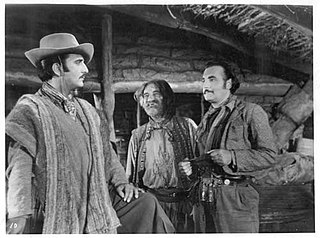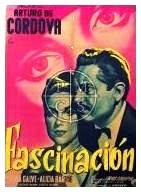Related Research Articles

Tito Alonso (1926–1979) was an Argentine film actor.

Aída Alberti was an Argentine film actress of the Golden Age of Argentine cinema.
Caras argentinas is a 1939 Argentine musical film drama directed by Carmello Santiago. The film premiered in Buenos Aires on May 18, 1939 during the Golden Age of Argentine cinema.

Prisoners of the Earth, also known as Prisoners of the Land, is a 1939 Argentine drama film directed by Mario Soffici, one of the most celebrated films of the Golden Age of Argentine cinema. The film premiered in Buenos Aires. The film is often cited as one of the greatest in the history of Argentine cinema, and established Soffici as a "social" filmmaker. It was awarded by the Municipality of Buenos Aires as the best film of the year, and the Silver Condor Award instituted by the Argentine Association of Film Critics.
I Want to Die with You or Yo quiero morir contigo is a 1941 Argentine screwball comedy film directed by Mario Soffici during the Golden Age of Argentine cinema.

The Road of the Llamas or El Camino de las llamas is a 1942 Argentine film directed by Mario Soffici during the Golden Age of Argentine cinema.
Wake Up to Life is a 1945 Argentine drama film of the classical era of Argentine cinema, directed by Mario Soffici and starring Elisa Christian Galvé, Roberto Airaldi and Francisco de Paula. de Paula won a Silver Condor award for his performance.

Fascinación is a 1949 Argentine melodrama film of the classical era of Argentine cinema, directed by Carlos Schlieper and starring Alicia Barrié, Héctor Calcaño, and Susana Campos.

Pasó en mi barrio is a 1951 Argentine film directed by Mario Soffici during the classical era of Argentine cinema. It was entered into the 1952 Cannes Film Festival, where it was one of the nominees for the Grand Prize of the Festival.

El Gaucho y el diablo is a 1952 Argentine drama film of the classical era of Argentine cinema, directed by Ernesto Remani, based on a script by José María Fernández Unsain, who adapted it from the 1891 short story "The Bottle Imp", by Robert Louis Stevenson. The film stars Juan José Míguez, Elisa Galvé, Francisco Martínez Allende, and Elina Colomer.
Días de odio, literally translated as Days of Hate, is a 1954 Argentine film produced during the classical era of Argentine cinema. It is based on the short story Emma Zunz by Jorge Luis Borges. Días de odio was directed by Leopoldo Torre Nilsson and filmed in black and white. The script was adapted by Nilsson from the short story "Emma Zunz" by Jorge Luis Borges. The film was released on 3 June 1954, starring Elisa Galvé, Nicolas Freguês, Raul del Valle, Enrique de Pedro, Duilio Marzio and Virginia Romay in the main roles. The producer of the film was Armando Bó.

Comedians is a 1954 Spanish drama film directed by Juan Antonio Bardem. It was coproduced with Argentina in the context of its classical-industrial period, but it is a Spanish film about Spaniards actors on stage. Bardem confessed to being inspired by All About Eve. The film was entered into the 1954 Cannes Film Festival.

The 6th Cannes Film Festival was held from 15 to 29 April 1953. The Grand Prix of the Festival went to The Wages of Fear by Henri-Georges Clouzot.

María Esther Gorostiza Rodríguez, better known as Analía Gadé, was an Argentine actress. She appeared in more than 60 films between 1948 and 2001. She appeared in the film Emergency Ward, which was entered into the 1953 Cannes Film Festival. She was born in Córdoba, Argentina, and was the sister of Carlos Gorostiza. Three years after being diagnosed with cancer, she died on 18 May 2019, at the age of 87.

Under the Thousand Lanterns is a 1952 French-West German crime film directed by Erich Engel and starring Michel Auclair, Gisela Trowe, and Hanna Rucker. It was entered into the 1952 Cannes Film Festival. It was made by Real Film at the Wandsbek Studios in Hamburg and on location in the city. The film's sets were designed by Albrecht Becker and Herbert Kirchhoff.

Elisa Christian Galvé was an Argentine actress. She was best known for her roles in films in the 1940s and 1950s, during the Golden Age of Argentine cinema.

Graziosa Maggi, better known as Diana Maggi, was an Italian-born Argentine film, television, radio, and stage actress who was known for starring in the 1950 film Campeón a la fuerza.

Juvenilia is a 1943 Argentine comedy-drama film of the classical era of Argentine cinema directed by Augusto César Vatteone. One of the most critically acclaimed Argentine films of 1943, at the 1944 Argentine Film Critics Association Awards the film won the Silver Condor Award for Best Film, Best Director for Vatteone, Best Supporting Actor for Eloy Álvarez and Best Adapted Screenplay for writers Pedro E. Pico, Manuel Agromayor and Alfredo de la Guardia.

Three Men of the River is a 1943 Argentine crime drama film of the classical era of Argentine cinema, directed by Mario Soffici and starring Elisa Galvé and José Olarra. The film is based on an old Argentine legend about an Aztec girl who is raped and murdered by vandals and dumped in a river. A flower blossoms at the place in which she was killed and misfortune falls upon the culprits.

The Idol is a 1952 Argentine-Chilean thriller film of the classical-era directed by Pierre Chenal and starring Alberto Closas, Elisa Galvé and Florence Marly. It was shot on location around Santiago including at the Municipal Theatre.
References
- ↑ "Festival de Cannes: Emergency Ward". festival-cannes.com. Archived from the original on 10 July 2011. Retrieved 24 January 2009.
- ↑ Sala de guardia (1952) - Awards - IMDb . Retrieved 4 November 2024– via www.imdb.com.